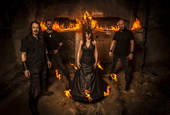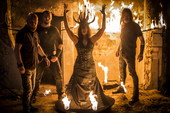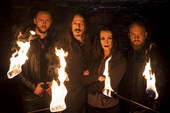Darzamat
The Philosopher Is On His Path
04.01.2021
Архив интервью | Русская версияTheir discography that spans over nearly a quarter of the century hardly has two identical albums. Poland’s Darzamat come up with something new each and every time, taking just a few years to cover the path from sympho black metal to gothic metal sounding “Oniriad” (2003), which many of the fans failed to understand and accept, and then back towards a more traditional sound that dominated their next three albums. However, after very solid “Solfernus’ Path” (2009), which featured such famous guests as King Diamond’s Andy La Rocque (guitar) and Stone Sour’s Roy Mayorga (drums), Darzamat remained silent for as long as 11 years, and it was only on October 27 this year when their fans were able to rejoice at the release of their new album “A Philosopher At The End Of The Universe”. I reached out to singers Flauros (actual name Rafał Góral) and Nera (Agnieszka Górecka) to find out about reasons behind being silent, special aspects of the latest album and the life of the band during that lengthy break.
First of all, my biggest compliments to everyone in the band on the release of the long-awaited “A Philosopher At The End Of The Universe”! Why did it take Darzamat so long to record a follow-up to “Solfernus’ Path”? Was it because you did not have enough exciting musical and/or lyrical ideas, or did you take a hiatus to focus on side-projects?
Flauros: The first two years after the release of "Solfernus' Path", we promoted the album, played some gigs. Among other things, a tour in Poland with Hate, several festivals, for example in Ukraine, Belgium, Germany, the Czech Republic and Mexico. It might not have been the number of concerts like after the album "Transkarptia" (2005), when we played most intensively in our history, but as usual we managed to reach several new places on the world map. Later we focused on other projects, I recorded the album "Parvzya" with my friends from Mastiphal and Nera with Markus (bass) recorded three albums under the name NeraNature.
None of us planned such a long break, nobody thought about ending Darzamat. Simply, it all happened naturally and it's hard to point to any one reason here, because there is no such thing. There is no sensation here, there was no quarrel in the band. This situation was caused by many factors: involvement in other projects, various life issues of each of us, as well as the distance related to my emigration. All this did not provoke good conditions for creating music.
Year after year passed and finally in 2015 we came back to play a few summer festivals. We probably played 3 concerts and just being on stage we felt that we really wanted to do it again. This is where the first talks about the new album started between us. With time, I started to fly to Poland more and more often, more and more things happened in the band and the first compositions slowly began to be created. However, certain processes take some time, and we like it when everything works as if we would like it to ourselves. That is why, not having binding deadlines, we did everything in our own rhythm.
From the Darzamat page on Facebook, I learned that you started writing and recording new material at least about two years ago. It was reported that the album had the working title of “The Burning Kingdom” and its tracklist, which was posted as a photo, contained 11 songs, of which only 9 made it to the final cut. What was the reason for changing the album title and leaving two songs out? Are you dissatisfied with the two missing tracks, or are you saving them for a later single or anything like that?
Nera: Exactly, it started with talking about coming back and it took place 3 years ago. Since then, ideas were born and we started working on the album. And that's true, last year we announced a new album, still under the working title. But then a lot happened, both positive things for the band and those less optimistic about our world that fell for a while at the turn caused by the pandemic. We originally planned to come back a little earlier, but we calmly embraced the global situation and focused on ourselves and our album.
In March, no one really knew what would happen the next day. All plans, professional and private, were questioned. That is why we immediately decided that we would wait until the album was released, and we would use the quarantine time to refine certain elements. Preparing, for example, video materials - I mean music videos and announcements.
Therefore, there is no question of changing the original concept in any way, quite the opposite. It is about going much deeper into this topic, developing the source idea and going a step further.
These “missing” songs will definitely be released at the right time and they are not worse than the ones that were released on the album. But at that point other tracks fit much better with the concept of the album.
Flauros: The pandemic situation gave us another couple of months alone with what we had created. Thanks to stopping the world, we were able to take a better look at the whole, and refine certain elements. We had time for it, we were in no rush. It is a very comfortable situation. For me, the subject of the album is closed when its release, and if it hasn't happened yet, the musician still has the opportunity to work on it. So why not take advantage of it? One day Nera called me and asked why this album is not called "A Philosopher at the End of the Universe". It's interesting, because this idea has been on my mind for several days. So we quickly came to the conclusion that the title of the song opening the entire album perfectly binds what the lyrics and the story itself contain, and takes it to the next level. The same concept, but we look at it from a different position, being a step further.
How much did the pandemic affect the band? Did you lose many shows and festivals this year? Did it also influence your lives outside the band in any manner?
Nera: We were planning a concert tour with the release of the new album, as well as some summer festivals. Unfortunately we had to postpone all concert plans for this year. The situation with the pandemic probably changes every aspect of our lives, as it is related with our jobs, politics and economics. We are still in limbo and can’t plan live shows for the upcoming year as well. All we can do now is to focus on making some more music.
If we take a look on the Darzamat back catalogue, I would mark three eras of the band’s history – the sympho black metal era of “In The Flames Of Black Art” (1996) and “In The Opium Of Black Veil” (1999), the gothic metal/experimental era of “Oniriad”, which you kind of discarded a few years later, and the return to the sympho black sound on the three following releases, though I would rather classify them as dark metal. In your opinion, is the new Darzamat album the beginning of the next era, or would you rather call it a continuation of “Solfernus Path” (even though some stylistic innovations are obvious to me)?
Flauros: It is definitely a continuation of “Solfernus’ Path” lyric-wise, it is another part, the development of a certain concept. As for the music side, I agree with the statement that this is the opening of a new stage of Darzamat. I think so because I already see some outlines of future compositions in my imagination and they have one important feature - they have no limitations. Therefore, stylistic innovations will appear in Darzamat. If only we feel that we want to use some tools so far perhaps not associated with Darzamat.
One of the innovations that immediately struck me when listening to “A Philosopher At The End Of The Universe” was the complete absence of keyboards which played a significant, if not a dominant, part in the music of Darzamat before. Nevertheless, you can recognize Darzamat from the very first track. I believe if you could take a time machine, go back to 2003 and release this record instead of “Oniriad”, it would have had a huge success. (smiles) Why did you decide to use no keyboards this time, and how do you plan to play old songs live without a keyboard player? Or was it a one-off experiment just to try something new?
Nera: It's a long-term decision, thought over and discussed by us for some time. I think that we were thinking about hiring a keyboard player for at least a year, but in the meantime new compositions were created and after listening to a few ready songs we believed that we could easily compose new songs without the use of keyboards. But we don't want to assume that we will never use this instrument again. However, at the moment we had a surfeit of this instrument. We wanted to sound different, definitely refresh the sound and go back to the roots of playing guitar, rock and metal music.
Flauros: The rejection of the keyboards meant that we had to focus more on the sound, but also on the work of individual instruments and vocals. Therefore there is much more simultaneous work of both vocals and some kind of vocal "dialogue". There are definitely more different guitar tones on this album, which, apart from typically heavy sounds, also play some kind of background, and there are also acoustic guitar parts. Plus, a great-sounding rhythm section. This proved to us that we can express what we feel without any problem using only such means, abandoning the keyboard instruments, so characteristic of Darzamat in the 90s and a decade later. In other words, using completely different tools, we created an atmosphere that is still characteristic of this band. In my opinion, this is an album that sounds strong, a bit modern, at the same time very atmospheric and sometimes even epic. In my opinion, there is a lot of space in it and each instrument or voice has its proper place in the final mix. In addition, it was possible to perfectly capture all the elements for which Darzamat was known so far. But I don't want to talk too much about it so as not to suggest anything to anyone. Listen to this album a few times and you will understand what I mean. Each audition brings something new, additional. It's like discovering the next layers ...
Another noticeable difference is the more “synched” use of Flauros’ and Nera’s voices. In particular, “The Tearful Game” stood out to me immediately thanks to the blend of the traditional Darzamat sound and atmospheric rock and epic elements of NeraNature. Did you intentionally try to bring the sound of your main band and its side projects closer? Or how would you describe the “intent” of this track?
Flauros: We don't want to label our music. We do not need this, as musicians we want to feel free, and labels will impose something on you. Darzamat wants to draw from different music regions in which we feel right at a given moment.
For example, I am surprised when people are surprised that my voice sounds similar in Darzamat and Mastiphal. And then I ask them if another person is recording these vocals? Of course, it's a different style, the vocal work is different, dirtier, more intense, but these sounds come from the same head and throat, so they can't be something completely different. The same Nera is the singer of Darzamat and NeraNature, and everything we do in life always leaves a trace in us. Nera is part of Darzamat and sometimes may sound a bit like on NeraNature’s albums, as the same person does work on both. I also think that it is an asset, not a minus and it broadens the thinking about music. Anyway, if opening up to changes and broadening our musical horizons brought us music in the form of the album "A Philosopher at the End of the Universe", this is probably the right direction.
Is there an overall concept and/or message behind the new album? If I may suggest, I would define the record as a philosophic and creative quest for one’s own identity in a spiritual realm following just the inner voice, and I think a line of the title track, “Human! King Of All Kings!”, sums it all very nicely. Would you agree with this idea, or does the album mean something completely different to you?
Nera: You’ve got it correctly. If we were to describe this album with one quote, this one would probably be the most appropriate. The concept of "The Philosopher at the End of the Universe" is a vision of a character who breaks all his barriers, crosses untapped areas and, above all, follows his inner voice. This person does not imitate anyone, does not follow any patterns. He creates because he knows his power and so he follows his own path, up to the boundaries of the universe... if any exist at all. Needless to say, he is not limited to the material world, on the contrary, it is more about discovering the spiritual world, following the path of higher dimensions. This album is about fighting for yourself, searching, traveling, and not being afraid to stand firm for what you believe in.
For the first time since “SemiDevilish” (2004), you have a photo, not a painting on the cover, even though color-wise, the new cover has a lot in common with “Solfernus’ Path”. What was your approach to the visual side of the album this time?
Nera: I would rather not give the listeners ready-made answers. But let's just say this: the figures form both covers mentioned are surely connected. The Philosopher is on his path, discovering the unknown, a lot more conscious and brave. The figure pulls off the mask and takes control over her/his life. And the story will be continued.
The cover, as well as promotional photos for the new album were done by Jeremy Astaszow, and I think he has done a fantastic job, but I can find no information on him at all on the Internet. Could you say a couple of words about Jeremy and your cooperation with him? Whose idea was it to shoot the band against the fiery background?
Nera: I agree, Jeremy did a fantastic job. This guy takes various photos as part of commercial and reportage projects, but for several years he has also been involved in theater photography, hence he loves challenges such as our fire photo shoot. If anyone would like to find more about him, feel free to visit his website, astashowstudio.pl, or on Instagram astaszow.photo, or Facebook: Astaszow Studio.
It's also nice that there is a trace of this photo session in the form of a music video for "The Great Blaze". However, the idea for a session like this is just the band’s idea. Since the whole idea of using fire is closely related to the concept of the album, and as I said before, I don't want to spoil the fun by interpreting everything in order ... (laughs). So, maybe instead of explaining ideas, I will quote one passage here: “I touch the dancing red / The pain is merely a whisper / On tips of flames I rise / Right into the sublime”.
As Jacek Gut was not able to record his drums on time due to personal reasons, you used Łukasz “Icanraz” Sarnacki of Corruption and Kamil Bagiński of Vane on a session basis in the studio. However there are just four musicians on promo photos. Are Darzamat looking for a new drummer, or is Jacek’s absence temporary and he will come back soon?
Flauros: The core of Darzamat has been made up of four of us for many years now: Nera, Chris (guitars), Markus and me. Of course, we really want a drummer to be in this line-up. However, I believe that such things must happen naturally. You have to stay with a man for a while and then decide if he fits in the band. Jacek couldn't play on this album for private reasons, so we used session drummers. At the moment we are playing together with Jacek, so I hope that he will stay in the band longer. Time will tell if both sides like what is offered.
You released singles/videos for “A Philosopher At The End Of The Universe” and “The Great Blaze” before the album release. Are there any plans to shoot more videos for any tracks off the album?
Nera: All the images we create for our music are always quite a challenge. For some time we’ve started producing our videos ourselves, thanks to our bassman Markus, who does this business. He edited "The Great Blaze" and "A Philosopher ..." and has just finished working on the music video for the closing song "Kaleidoscope of Retreat". We also have a video clip ready for the song "The Sleeping Prophet" by our friend Stanislaw Nolywajko from Rumburak Produkction. There is also the animated lyrics video for the song "A Philosopher ..." by Natalia from N.Station Studio. So we do our best to present our newest album accompanied by music videos, which takes us a lot of time but also brings a lot of satisfaction.
As playing live is very complicated these days, lot of bands livestream their shows from the studio, and even though their atmosphere is hardly the same, it is still a way to connect a band to its fans. Have you considered doing something like a livestream with Darzamat, and what’s your opinion of livestreams in general? Have you watched any other band doing it, and if yes, did you enjoy it?
Flauros: It's not the same ... a few days ago I watched the world's great pop star perform in one of the biggest and most beautiful halls in London from behind the scenes. The room was empty and the girl was making a live stream on the internet and you know what ... it was hard for me to find emotions in it, which wouldn’t have been the case if the room had been full of people. We don't have to do such things. We don't feel it and we don't like it. If the situation with the lack of the possibility of live performances lasts longer, we will probably take it under consideration but certainly live streams are not close to our hearts. If we were to come to something like this, in the case of Darzamat we would have to find an unusual formula that would suit us.
Both Flauros and Nera were active with other projects during Darzamat’s 11-year break in between studio albums. Now that Darzamat have a new album on the agenda, shall we expect anything new from Mastiphal or NeraNature in the near future?
Nera: Never say never, we don't close the doors behind these projects and if there is right time and space we might consider recording some more stuff. Currently, however, our focus is on Darzamat. We didn't come back after such a long break to take a break for other bands now.
My next question is to Nera. NeraNature’s “Magja” album was sung totally in Polish, unlike this band’s two previous albums, which were done in English – what is the reason? I personally find some similarities between some tracks off “Magja”, such as “Słowiańska Łza”, and early albums by Moonlight - “Kalpa Taru” and “Meren Re”. Did Moonlight influence you anyhow? If not, who else did?
Nera: Choosing my mother tongue was a challenge for me because it is not easy to sing in Polish. I also wanted to play a little bit with the language itself, to use metaphors and comparisons that would express what I wanted to convey. Generally speaking, when using English, I ask some linguist for help not to lose the meaning of the message. This time I wanted to do it myself. As for influences and inspirations, I won't mention specific bands. I listen to very few bands with female vocals unless it's jazz. I also do not know the songs you mentioned. Of course, we do not live in a vacuum and everything we listen to conditions us in some sense, but I do not follow artists on purpose.
The “Live Profanity (Visiting The Graves Of Heretics)” DVD includes, apart from your original songs, a cover version of Kat’s “Diabelski Dom Cz.II” performed together with Roman Kostrzewski. How did such an interesting collaboration come together? Did you consider recording “Diabelski Dom Cz.II” in the studio, for the DVD is, to the best of my knowledge, your only release to feature this track?
Flauros: I have been a fan of the band Kat since my teenage years, so I have always dreamed of performing with Romek Kostrzewski on one stage. The vocalist has always inspired me with his rebellious personality, questioning the existing reality. During the preparations for the Metalmania 2007 festival we came up with such an idea and finally managed to implement it. We didn't record this track in the studio though. It was about a one-off performance, capturing the emotions of the first moment. I think it turned out great and I am glad that we had the opportunity to perform with Romek.
Your fans often ask you to play something from the first album and the follow-up EP. For example, at your latest gig in Moscow you played “The Storm” and “From The Earth To The Stars”. “In The Flames Of Black Art” turns 25 years old next year – do you have any plans to celebrate this anniversary? For example, by playing the album live in full at some special shows?
Flauros: It's true, some fans only want to listen to old songs, and we are getting further and further away from those times. New albums are being made, even if we are currently releasing a new album, and new songs are already being created. It's difficult to come back to those albums, because only me was left from the original line-up. Re-reading this album in its entirety would take us the same time as writing a new album, so we prefer to spend time writing new compositions. Nevertheless, I think you should notice the fact that 25 years ago we released our debut album. We are currently talking about the re-edition of this album and maybe it will be released in different formats, in which this album has not been released yet. Perhaps a song from the debut will appear in the live set, but there will be time for such decisions yet.
Once again thank you for the excellent new record and for finding the time to answer this interview. Before we wrap it up, what are your future plans with Darzamat? Are there any chances of seeing you again in Moscow after the pandemic subsides?
Flauros: Russia, and Moscow in the first place, is definitely on the list of places we would like to return to. And we strongly believe that such a return will occur as soon as the world deals with the pandemic. We always remember our concerts in your country very well.
Nera: Thank you for an interesting conversation and hopefully see you soon! Greetings to our friends and fans in Russia!
Darzamat on the Internet: http://www.darzamat.pl/
Interview by Dmitry “Ward” Kulikov
Translation assistance by Roman Patrashov
Photos by Jeremy Astaszow (photos are used courtesy of Flauros)
December 29, 2020
© HeadBanger.ru





